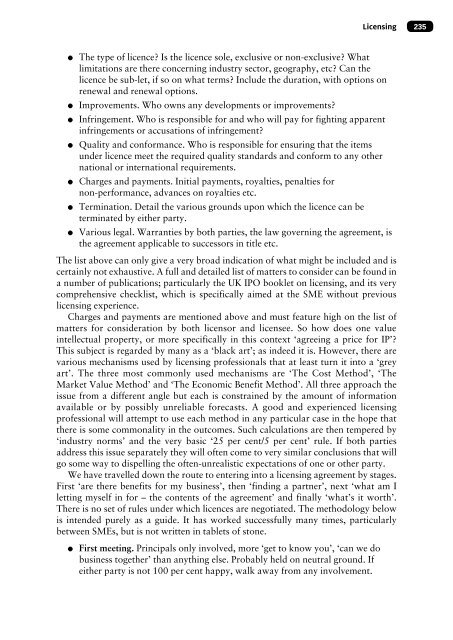The growing business handbook : inspiration and advice ... - Sparkler
The growing business handbook : inspiration and advice ... - Sparkler
The growing business handbook : inspiration and advice ... - Sparkler
You also want an ePaper? Increase the reach of your titles
YUMPU automatically turns print PDFs into web optimized ePapers that Google loves.
Licensing<br />
235<br />
●●<br />
●●<br />
●●<br />
●●<br />
●●<br />
●●<br />
●●<br />
<strong>The</strong> type of licence? Is the licence sole, exclusive or non-exclusive? What<br />
limitations are there concerning industry sector, geography, etc? Can the<br />
licence be sub-let, if so on what terms? Include the duration, with options on<br />
renewal <strong>and</strong> renewal options.<br />
Improvements. Who owns any developments or improvements?<br />
Infringement. Who is responsible for <strong>and</strong> who will pay for fighting apparent<br />
infringements or accusations of infringement?<br />
Quality <strong>and</strong> conformance. Who is responsible for ensuring that the items<br />
under licence meet the required quality st<strong>and</strong>ards <strong>and</strong> conform to any other<br />
national or international requirements.<br />
Charges <strong>and</strong> payments. Initial payments, royalties, penalties for<br />
non-performance, advances on royalties etc.<br />
Termination. Detail the various grounds upon which the licence can be<br />
terminated by either party.<br />
Various legal. Warranties by both parties, the law governing the agreement, is<br />
the agreement applicable to successors in title etc.<br />
<strong>The</strong> list above can only give a very broad indication of what might be included <strong>and</strong> is<br />
certainly not exhaustive. A full <strong>and</strong> detailed list of matters to consider can be found in<br />
a number of publications; particularly the UK IPO booklet on licensing, <strong>and</strong> its very<br />
comprehensive checklist, which is specifically aimed at the SME without previous<br />
licensing experience.<br />
Charges <strong>and</strong> payments are mentioned above <strong>and</strong> must feature high on the list of<br />
matters for consideration by both licensor <strong>and</strong> licensee. So how does one value<br />
intellectual property, or more specifically in this context ‘agreeing a price for IP’?<br />
This subject is regarded by many as a ‘black art’; as indeed it is. However, there are<br />
various mechanisms used by licensing professionals that at least turn it into a ‘grey<br />
art’. <strong>The</strong> three most commonly used mechanisms are ‘<strong>The</strong> Cost Method’, ‘<strong>The</strong><br />
Market Value Method’ <strong>and</strong> ‘<strong>The</strong> Economic Benefit Method’. All three approach the<br />
issue from a different angle but each is constrained by the amount of information<br />
available or by possibly unreliable forecasts. A good <strong>and</strong> experienced licensing<br />
professional will attempt to use each method in any particular case in the hope that<br />
there is some commonality in the outcomes. Such calculations are then tempered by<br />
‘industry norms’ <strong>and</strong> the very basic ‘25 per cent/5 per cent’ rule. If both parties<br />
address this issue separately they will often come to very similar conclusions that will<br />
go some way to dispelling the often-unrealistic expectations of one or other party.<br />
We have travelled down the route to entering into a licensing agreement by stages.<br />
First ‘are there benefits for my <strong>business</strong>’, then ‘finding a partner’, next ‘what am I<br />
letting myself in for – the contents of the agreement’ <strong>and</strong> finally ‘what’s it worth’.<br />
<strong>The</strong>re is no set of rules under which licences are negotiated. <strong>The</strong> methodology below<br />
is intended purely as a guide. It has worked successfully many times, particularly<br />
between SMEs, but is not written in tablets of stone.<br />
●●<br />
First meeting. Principals only involved, more ‘get to know you’, ‘can we do<br />
<strong>business</strong> together’ than anything else. Probably held on neutral ground. If<br />
either party is not 100 per cent happy, walk away from any involvement.








